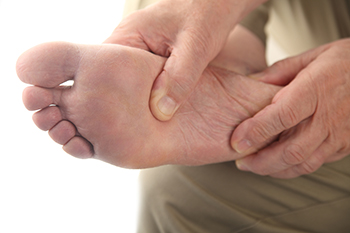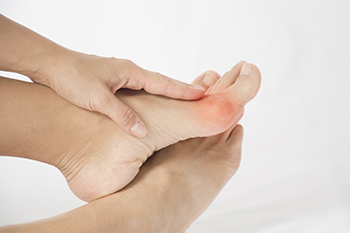Connect With Us
Blog
Items filtered by date: August 2023
Diabetic Foot Exams

A diabetic foot exam is vital for individuals with diabetes due to their increased risk of developing foot problems resulting from nerve and blood vessel damage because of high blood sugar levels. Diabetic neuropathy, caused by this damage, can lead to numbness or a loss of sensation in the feet, making it challenging to detect calluses, blisters, or cuts. If left untreated, these issues can progress to ulcers and infections, potentially necessitating amputation. A diabetic foot exam aims to identify these problems early to prevent severe complications. The process involves gathering information about medical history, diabetes management, medications, and any symptoms experienced. A thorough skin examination checks for dryness, cracking, calluses, blisters, ulcers, or other abnormalities and compares the temperature of the feet for symmetry. Nerve function and sensation in the feet, blood flow, and foot and ankle pulses are assessed, as well as musculoskeletal problems like bent or overlapping toes. To maintain healthy feet, individuals with diabetes should perform daily self-checks and practice proper foot hygiene. If you have diabetes, it is suggested that you make an appointment to see a podiatrist and include this specialist among your healthcare providers to see regularly.
Diabetic foot care is important in preventing foot ailments such as ulcers. If you are suffering from diabetes or have any other concerns about your feet, contact one of our podiatrists from Florida Foot & Ankle Group, P.A.. Our doctors can provide the care you need to keep you pain-free and on your feet.
Diabetic Foot Care
Diabetes affects millions of people every year. The condition can damage blood vessels in many parts of the body, especially the feet. Because of this, taking care of your feet is essential if you have diabetes, and having a podiatrist help monitor your foot health is highly recommended.
The Importance of Caring for Your Feet
- Routinely inspect your feet for bruises or sores.
- Wear socks that fit your feet comfortably.
- Wear comfortable shoes that provide adequate support.
Patients with diabetes should have their doctor monitor their blood levels, as blood sugar levels play such a huge role in diabetic care. Monitoring these levels on a regular basis is highly advised.
It is always best to inform your healthcare professional of any concerns you may have regarding your feet, especially for diabetic patients. Early treatment and routine foot examinations are keys to maintaining proper health, especially because severe complications can arise if proper treatment is not applied.
If you have any questions please feel free to contact one of our offices located in Debary, Lake Mary, Orlando, and Oviedo, FL . We offer the newest diagnostic and treatment technologies for all your foot and ankle needs.
Causes, Definition, and Embracing Life While Living With a Bunion

Bunions are a prevalent foot condition, bringing discomfort and challenges to daily life. These bony protrusions, medically known as hallux valgus, develop at the joint where the big toe meets the foot. They often occur from a combination of factors, including genetics, ill- fitting footwear, and structural anomalies in the foot. Defined by the outward deviation of the big toe and the subsequent misalignment of bones, bunions can cause pain, swelling, and difficulty in finding comfortable shoes. Living with bunions requires proactive measures. Choosing shoes that have ample toe space and arch support can help to reduce discomfort. Surgery may be needed for removal if the bunion is severe and affecting the other toes. If you have a bunion, it is strongly suggested that you are under the care of a podiatrist who can provide you with treatment options that are right for you.
If you are suffering from bunion pain, contact one of our podiatrists of Florida Foot & Ankle Group, P.A.. Our doctors can provide the care you need to keep you pain-free and on your feet.
What Is a Bunion?
Bunions are painful bony bumps that usually develop on the inside of the foot at the joint of the big toe. As the deformity increases over time, it may become painful to walk and wear shoes. Women are more likely to exacerbate existing bunions since they often wear tight, narrow shoes that shift their toes together. Bunion pain can be relieved by wearing wider shoes with enough room for the toes.
Causes
- Genetics – some people inherit feet that are more prone to bunion development
- Inflammatory Conditions - rheumatoid arthritis and polio may cause bunion development
Symptoms
- Redness and inflammation
- Pain and tenderness
- Callus or corns on the bump
- Restricted motion in the big toe
In order to diagnose your bunion, your podiatrist may ask about your medical history, symptoms, and general health. Your doctor might also order an x-ray to take a closer look at your feet. Nonsurgical treatment options include orthotics, padding, icing, changes in footwear, and medication. If nonsurgical treatments don’t alleviate your bunion pain, surgery may be necessary.
If you have any questions, please feel free to contact one of our offices located in Debary, Lake Mary, Orlando, and Oviedo, FL . We offer the newest diagnostic and treatment technologies for all your foot care needs.
Are Bunions Affecting Your Everyday Life?
Blog Archives
- April 2025
- March 2025
- February 2025
- January 2025
- December 2024
- November 2024
- October 2024
- September 2024
- August 2024
- July 2024
- June 2024
- May 2024
- April 2024
- March 2024
- February 2024
- January 2024
- December 2023
- September 2023
- August 2023
- June 2023
- May 2023
- April 2023
- March 2023
- February 2023
- January 2023
- December 2022
- November 2022
- October 2022
- September 2022
- August 2022
- July 2022
- June 2022
- April 2022
- March 2022
- February 2022
- January 2022
- December 2021
- October 2021
- September 2021
- August 2021
- July 2021
- June 2021
- May 2021
- April 2021
- March 2021
- February 2021
- January 2021
- December 2020
- November 2020
- October 2020
- September 2020
- August 2020
- July 2020
- June 2020
- May 2020
- April 2020
- March 2020
- February 2020
- January 2020
- December 2019
- November 2019
- October 2019
- September 2019
- August 2019
- July 2019
- June 2019
- May 2019
- April 2019
- March 2019
- February 2019
- January 2019
- December 2018
- November 2018
- October 2018
- September 2018
- August 2018
- July 2018
- June 2018
- May 2018
- April 2018
- March 2018
- February 2018
- January 2018

